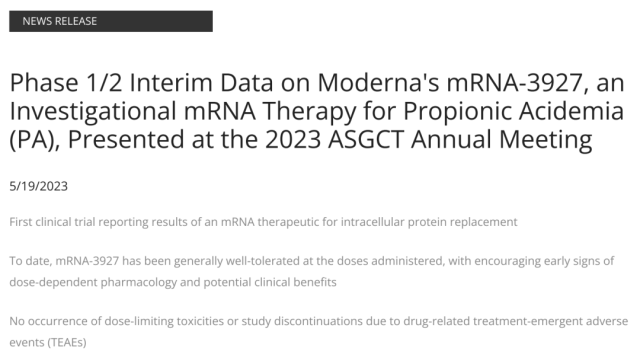Moderna’s first mRNA-based protein replacement therapy passed early clinical trials
- Why Botulinum Toxin Reigns as One of the Deadliest Poisons?
- FDA Approves Pfizer’s One-Time Gene Therapy for Hemophilia B: $3.5 Million per Dose
- Aspirin: Study Finds Greater Benefits for These Colorectal Cancer Patients
- Cancer Can Occur Without Genetic Mutations?
- Statins Lower Blood Lipids: How Long is a Course?
- Warning: Smartwatch Blood Sugar Measurement Deemed Dangerous
Moderna’s first mRNA-based protein replacement therapy passed early clinical trials
- Red Yeast Rice Scare Grips Japan: Over 114 Hospitalized and 5 Deaths
- Long COVID Brain Fog: Blood-Brain Barrier Damage and Persistent Inflammation
- FDA has mandated a top-level black box warning for all marketed CAR-T therapies
- Can people with high blood pressure eat peanuts?
- What is the difference between dopamine and dobutamine?
- How long can the patient live after heart stent surgery?
Moderna’s first mRNA-based protein replacement therapy passed early clinical trials
Moderna , which has achieved great commercial success with its mRNA COVID-19 vaccine , is actively exploring the application of mRNA beyond vaccines, including mRNA-based gene editing therapy, cell therapy, and representative replacement therapy .
Since the company was founded, Moderna has set the goal of transforming human cells into drug production factories. By hijacking cellular mechanisms, cells in the body can produce therapeutic molecules by themselves. Moderna hopes to deliver mRNA to cells in this way. , for protein replacement therapy.
On May 19, 2023, Moderna reported for the first time at the 2023 American Society for Gene + Cell Therapy Annual Meeting (ASGCT) the Phase 1/2 clinical trial data of its mRNA – 3927 therapy , which is encapsulated by lipid nanoparticles Two mRNAs encode two protein subunits PCCA and PCCB, respectively, to synthesize propionyl-CoA carboxylase (PCC) for the treatment of propionic acidemia (Propionic Acidemia, PA) .

Propionic acidemia (PA) is a rare autosomal recessive genetic disease. Due to the mutation of PCCA or PCCB gene, the activity of propionyl-CoA carboxylase (PCC) encoded by it is lost, resulting in the loss of propionate and its metabolites in the body. Abnormal accumulation can cause metabolic acidosis, high blood ammonia, brain damage and multiple organ damage.
The phase 1/2 clinical trial showed early signs of efficacy, with many patients who had potentially life-threatening metabolic dysregulation events before receiving mRNA therapy , and their incidence of metabolic dysregulation events was significantly reduced after receiving treatment , The risk of metabolic dysregulation was reduced by 66% overall and by 78% in the four cohorts treated with one injection every two weeks .
This suggests that mRNA technology could treat propionic acidemia by replacing the protein in cells .
Kyle Holen , M.D. , director of development, therapeutics and oncology at Moderna, said that as the clinical trial enters the dose expansion phase, we continue to observe encouraging results for mRNA-3927, and we will further evaluate safety, efficacy, and determine future Recommended dosage in clinical studies. So far, we have treated more than 13 patients for more than one year.
Paper link :
https://investors.modernatx.com/news/news-details/2023/Phase-12-Interim-Data-on-Modernas-mRNA-3927-an-Investigational-mRNA-Therapy-for-Propionic-Acidemia-PA- Presented-at-the-2023-ASGCT-Annual-Meeting/default.aspx
Moderna’s first mRNA-based protein replacement therapy passed early clinical trials
(source:internet, reference only)
Disclaimer of medicaltrend.org
Important Note: The information provided is for informational purposes only and should not be considered as medical advice.



